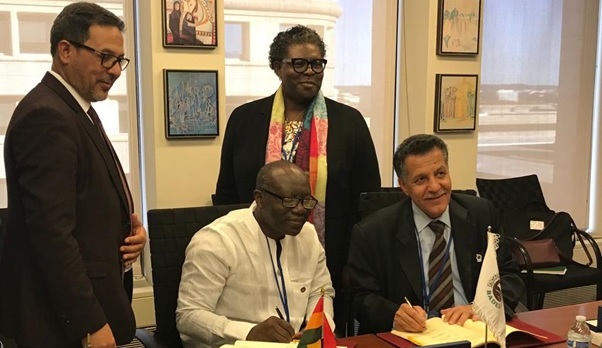Washington DC, October 18, 2019 - Ghana has signed two loan agreements worth over USD 70 million to improve quality post graduate education and build educational infrastructure in the country.
The first agreement, worth USD60m was between the government and the World Bank Group to improve the quality, quantity and development impact of post graduate education as well as support short term courses in selected universities.

Ken Ofori Atta, Minister for Finance and Pierre Frank Laporte, World Bank Country Director for Ghana initialled for Ghana and the World Bank Group respectively.
Known as the “First Higher Education Centres of Excellence for Development Impact Project”, it is expected to close the skills gap and increase productivity, improve faculty and staff qualifications, teaching and research, as well as lead to sustainable and global competitive post graduate programmes in the country.
The beneficiaries will be selected students who are pursuing post graduate courses and Centres of Excellence /Universities.
The implementing universities are University of Ghana, Kwame Nkrumah University of Science and Technology, University of Cape Coast, University of Development Studies, University of Energy and Natural Resources. The National Council for Tertiary Education will serve as the coordination institution and report to the Ministry of Education.
The second agreement between government and the Arab Bank for Economic Development in Africa (BADEA) worth 13.5 million is for the construction of 44 primary schools throughout the country.
Minister for Finance, Hon. Ken Ofori-Atta and H.E. Eng. Yousef Bin Ibrahim Al-BASSAM, Chairman of the Board of Directors of the Arab Bank for Economic Development (BADEA) signed the loan agreement for an amount of USD$13.5million for the implementation of the “Support to Basic Education in Five Regions Project”.
The project aims to support and improve basic education in Ashanti, Central, Eastern, Western and Brong Ahafo (now Ahafo, Bono and Bono East).
It would involve the construction of forty-four (44) basic schools, provision of furniture and equipment and other ancillary works.
The project would help provide better opportunities for the poor and rural communities to access education, increase the desire to learn, reduce stress on crowded classrooms, improve the quality of education, bridge the gender gap in access to education and reduce underdevelopment.
The project forms part of efforts by government to develop and expand basic education opportunities in the country.
The agreements were signed on the side lines of the 2019 Annual Meetings of the IMF and the World Bank in Washington DC on Friday 18th October 2019. END
